- Home
- Patricia Briggs
[Hurog 01] - Dragon Bones Page 6
[Hurog 01] - Dragon Bones Read online
Page 6
“Yes, but Hurog will survive.” I decided to change the subject. There was nothing I could do about the harvest. “Thank you for the clothes. I assume you’re responsible for the Brat’s wardrobe, too.”
He nodded. “I’m very good with clothing.”
“Did you do the embroidery by hand?” I asked.
He shook his head. “Magic work. But I do sometimes, when I have the time. I . . .” He closed his eyes. “I often have too much time.”
I stretched out and threw another log into the fire, which was getting low. Even in the summer, the old stone building got chilly in the evenings.
3
Wardwick
I was caught in the web I’d spun. Instead of breaking free, I tried to convince myself I was safer there.
“AT LEAST HE CAN fight,” I heard one of the men mutter to another. I couldn’t be sure who it was just from the voice, and my eyes were occupied with my opponent.
“One on one, when he doesn’t have to remember orders. But in three years, he’ll be giving the orders. I’m gonna be gone by then.” No mistaking the oddly nasal tenor of Stala’s second. In the three weeks since my father’s death, I’d been treated to several variants of this conversation.
A muttered curse from my opponent brought my attention back to the fight. Ilander of Avinhelle was new to the Guard, and this was the first time he’d drawn me for all-out pairs.
The Blue Guards drew fighters from four of the five kingdoms: Shavig, Tallven, Avinhelle, and Seaford. If a man lasted a few years here, he could expect to be first or second in any guard. There weren’t any Oranstonians because fifteen years ago, the Blue Guards under my father’s command had been instrumental in putting down the Oranstonian Rebellion.
Ilander might have been new, but he understood that my aunt had trained me since I picked up the sword, so he shouldn’t have assumed I’d be easy. Still, he’d watched me all week in drills after Stala had announced the participants in the weekly slaughter. But drills were drills, and all-outs were battle. During drills, I regularly “forgot” the patterns, especially if Stala changed them very often. I slowed down and refused to use all my strength against an opponent who was just interested in getting the swings right. Was it my fault Ilander thought that meant I was slow and clumsy? Ilander, who thought that playing tricks on the stupid boy was really funny.
I smiled at him sweetly as I gave an awkward twitch of my sword in a feeble-looking attempt to parry his deadly slice. It made him look really bad when my parry worked. He growled and swung overarm in the mistaken impression I couldn’t hit his body with a killing stroke and still catch his blade before he lopped something important off—like my head.
Stala called it with a shrill, two-fingered whistle as soon as the tip of my sword whipped across his belly armor, but it was my blade that stopped his sword. In a serious fight, he would have been dead. If I hadn’t caught his blade, I would have been dead, practice or not. He wanted to continue; I could see the rage in his eyes as I met his gaze mildly.
“Good fighting,” I said earnestly, stepping back and letting his sword slide off mine. “It was good fighting, wasn’t it, Stala?”
Stala snorted. “Ilander, you’re not a boy. You should know better than to get angry with your opponent. When you’re facing someone who has already proven stronger than you, not to mention faster, it’s the height of stupidity to pull a move like that overhand. You’re lucky you didn’t really get hurt.”
“I’m sorry I made you mad, Ilander,” I said, giving him my best cow-eyed look. “I won’t do it again.”
Ilander, who’d been flinching under the sting of my aunt’s tongue, returned to his earlier state of rage. His face flushed, and his nostrils flared whitely. “You—”
“Careful,” barked Stala, and Ilander shut his teeth with an audible click. When she was satisfied he wasn’t going to say anything more, she relaxed. “Go wash up. You’re off for the rest of the day. Lucky will take your place on guard duty.”
Lucky’s position in the circle of guards was just behind Stala and to her right. Being a relatively intelligent man, he stiffened apprehensively. She didn’t even look at him, keeping her eyes on the dirt in front of her. “I told you to quit fleecing money from the fledglings, Lucky. How much did you take him for?”
“A silver, sir.”
“Betting that he couldn’t beat Ward.”
“Yes, sir.”
“You know what? Sometimes I can work magic better than Licleng. Watch me. Poof!” She raised her hands in a theatrical manner. “That bet didn’t happen.”
He thought about arguing, opened his mouth to do it twice. “Yes, sir,” was all he got out.
Lucky taken care of, Stala turned her attention to me. “Ward, you haven’t even worked up a sweat.”
I frowned thoughtfully, decided sniffing my armpit would be overkill, then nodded my head.
“After everyone else is through, you and I will have a go of it, eh?”
I smiled and nodded. Even if no one had thought I was stupid before, the smile would have done it. No one beat Stala. Like Lucky, I wondered just how much she knew. Did she, for instance, know that I’d baited Ilander deliberately? Did she intend our upcoming bout to punish me for it?
• • •
SWEATING ENOUGH EVEN FOR Stala, I limped up the stairs of the keep. Every movement hurt, but that was to be expected. Stala was tall for a woman, and thirty-odd years of fighting had made her muscular. I was stronger, faster, and had a longer reach than she did, but Stala fought dirty. In an all-out, the only thing that mattered was winning, and she liked to win.
I rubbed my left eye cautiously, removing a few more grains of sand. I couldn’t use dirty tricks without giving my act away, but I was learning them, all the same.
When I opened the door, Oreg was waiting in my room with a smirk on his face. I forgave him the smirk as soon as I saw the tub of hot water. I dropped my unpleasantly damp clothing and stepped into the water. The tub was built for my father (the only thing besides Axiel that I had appropriated), so I fit inside it. I sighed as the heat pulled the stiffness from my aching muscles.
“Do I thank you or Axiel?” I asked, reaching for a sliver of soap.
“Axiel hauled the water, but I’ve heated it again.”
“Thanks,” I said, ducking my head under the water and staying there for a bit. But the stain of what I’d done this morning still clung to me. Oh, there was no shame in losing to my aunt. Everyone lost to her—but most of them couldn’t make her work for it. What bothered me was the fight with Ilander.
I came up for air.
“I watched you fight,” said Oreg, sitting on my stool and balancing it on two legs without putting his feet on the floor. I wondered if his balance was that good or if he was using magic. My ability to detect magic was a vague thing, and Oreg infused any area he was directly in with so much magic, I had a hard time telling if there were small spells being worked. It felt like Hurog’s magic, and I sometimes wondered if he was the magic I could always feel here or if he just tapped into it.
He used his magic a lot more than most magicians I knew—even the good ones at court. I couldn’t tell if he was more powerful, less discreet, or just trying to impress me.
“You mean when my aunt almost eviscerated me?”
“No,” he smiled at the wall beyond me. “When you made an idiot out of the new guard. Ilandei? No, that’s a Tallvenish name and he’s Avinhellish. Ilander.”
My father was dead. My uncle was acting like a conscientious regent, handling the affairs of Hurog as well as if it were his own estates. Better, perhaps. For the last three days, he’d been out most of the day working to reclaim the land the salt had taken. He’d had broken shells brought from the sea in wagonloads and was directing their spreading on top of the salt. It wouldn’t work. My several times great-grandfather, Seleg, had tried something similar when the creep had first been seen, but it hadn’t worked. I’d read about it in his journals.
> I could have saved Duraugh three days of work. But an idiot would hardly have read the dusty, mostly illegible scrawls hidden on a remote shelf in the library. Guilt vied with fear. No longer was it fear for my life—nothing so noble.
So to distract myself from the guilt of watching Duraugh put all the effort into a losing project, I played games with an unfortunate guardsman while my uncle struggled to do his best for Hurog.
“You showed him,” continued Oreg unhelpfully. “He won’t try that trick with oatmeal and helmets again. Not on you. He’s learned to treat the Hurogmeten with more respect.”
I watched Oreg narrowly. Was he commenting or fishing? Could Oreg see the guilt that rode me? I couldn’t tell. My father’s care had made certain I was very good at reading people, but Oreg was another matter altogether. He’d been a slave for a very long time.
I grabbed another sliver of soap and used it to scrub my hands clean of the metallic odor of my sword.
“What was my uncle like as a boy?” I asked to distract him from this morning’s fight.
“I think I liked him.” Oreg’s stool rocked back and forth. “It’s been too long ago. I used to remember everything, but I stopped doing that. Now I forget as fast as I can.” His face had a blank inward look that made me uneasy. It usually precluded some of his odder moments.
“You think I should let him know,” I accused. “You were the one who told me to listen to my instincts.”
He set the stool carefully down on all four feet, then slid off and away, out of my reach. Pansy was coming along much faster than Oreg, but then Pansy had only four years of mistreatment to forget. “What could he really do to you? You’re not twelve anymore. I think . . . I think that the pretense is harming you more than it is protecting you.”
“I’m going riding,” I said, standing up in a rush of water, ignoring his flinch at my sudden movement. I took a bit of toweling and dried myself briskly. “I need to clear my head.”
As I dried off, I couldn’t keep my lip from curling up in a self-directed sneer. Oreg was right: Regardless of my uncle’s trustworthiness, it was time to throw off the disguise, but that’s where the fear came in. I didn’t want to confess to my uncle that I’d hidden myself under a mask of stupidity for seven years out of fear of my father. It had been easier to tell Oreg, but then Oreg knew my father as I had. He had been here when my father had beaten me almost to death in a frenzy of jealous rage.
It was beautifully ironic. I, who had pretended for a third of my life to be an idiot, didn’t want to appear to be a fool.
I laughed shortly and stalked to the wardrobe to get fresh clothing. “When I get back, I’ll tell my uncle that I’m not as dumb as I look.”
• • •
I HADN’T RIDDEN PANSY much yet, and the ride I envisioned wasn’t one that would do him any good at this stage. My usual mount for my mountain runs was a big liver chestnut mare I called Feather for the wisp of white on her wide forehead. She was deep chested, big boned, and loved to run as much as I needed her to.
For her, the wild race over the side of the Hurog mountains was fun; for me, it was a necessary escape. While we raced up narrow trails and down steep-sided gorges, I had to keep my mind on where we were going rather than let my thoughts twist round and round about matters I had no control over.
While we ran, the only thing that was real was the heaving of her great barrel under my calves and the thunder of her hooves. I smelled the sweat of her effort and heard the even rhythm of her breaths. When that rhythm broke, I would stop.
The trail I directed her to today was challenging, full of dead-fallen timber and abrupt twists. We both knew it well. Usually, we stopped at the top of a craggy ridge near a lightning-struck tree and turned back toward Hurog at a saner pace. But when we flew past the tree, Feather was fresh, and I was still twisting between right and embarrassment.
We tore around a sharp corner at the top of a steep slope. I leaned my weight to the inside to help her negotiate the abrupt turn, and the soft soil under her outside hoof gave way.
She would have fallen then, and we’d have rolled all the way to the bottom of the mountain, except that I shifted my not inconsiderable weight and pulled her head around to send us galloping swiftly down terrain that was little better than cliff face.
I gripped her with my legs and watched her ears so I could anticipate the direction she would dodge around the larger rocks. I had to steady her head without interfering in her frantic attempt to keep her legs under her as our combined weight pulled us downward. If the slope hadn’t been so steep, I could have thrown my weight back and asked her to slide on her haunches, but here such a move would have been fatal. There was a tangle of downed trees at the bottom, and somehow she managed to leap and jump through them at a speed no sane horse would have taken.
If she had been a fraction less bold, we’d never have made it. I honestly don’t know how she kept her feet—nor for that matter how I stayed on top while she did it—but we were still upright when she stumbled to a halt. Her breathing rocked me, and the sweat of terror and effort warmed my legs.
“Shh, Feather,” I said, patting her neck. “What a good girl you are, what a lady,” and other such nonsense until the white left her eye and she rubbed her head on my knee with one of those incredible contortions horses are capable of.
I swung off and landed on wobbly legs. I checked Feather over thoroughly, but she only had two minor cuts and no lameness. By the time we were halfway home, she was cool and relaxed, unlike me. I’d almost killed the both of us with my stupidity. When we got home, I’d explain everything to my uncle.
THE GROOMS WERE WORKING on a pair of strange horses that looked even more tired than my poor Feather when I rode into the stable yard. From the colors on their headstalls, gold and gray, they were Garranon’s.
Garranon was an Oranstonian noble; moreover, he was the high king’s favorite. Normally, he spent all of his time at court or hunting on the estates of various acquaintances because Oranstonian lords, even the king’s favorite, were forbidden to spend much time at their own estates, a consequence of the Oranstonian Rebellion. I couldn’t fathom what he would be doing here.
THERE WAS NO ONE in the great hall except for Oreg when I came in. He stood splay-legged, hands clasped behind his back, and stared at the ancient message, the Hurog curse, carved into the wall.
There was such intentness in his expression that I stared at it, too, but it hadn’t changed. The runes still looked as though they had been rough-carved with a hunting knife, but no knife I’d seen would dig into stone. In some places, the writing implement had dug in almost a finger’s length, and at others, it was little more than a faded scratch. Each rune was nearly as tall as me.
“Oreg?” I said, after a quick glance to confirm that the room was empty. I was the only one who saw him whenever he was present. He used some sort of magic to keep other people from seeing him, though he usually showed himself to Ciarra, too. I’d learned to be very careful about talking to him in public places. I was supposed to be stupid, not crazy.
Magic began to gather in the room so strongly it brought a flush to my face. Much more magic than usually surrounded Oreg.
“Oreg?” I asked with a bit more urgency.
“I wrote this,” he said, waving a hand at the wall. “I did it after he killed the dragon. Her eyes shimmered with silver waves, and he killed her, so I presented Hurog’s future to him.”
“It looks like a lot of work,” I observed, trying to draw his attention. I’d begun to recognize when Oreg was about to have one of his fits. Sometimes he talked to people who weren’t there or just stared blindly through me. Usually, he left abruptly, and the next time I saw him, he was fine. But once or twice, I’d been able to pull his attention to me and stop the fit.
“He couldn’t read it—illiterate bastard.” His voice hit the last word with raw hatred.
“It’s in old Shavig. Not many people can read it,” I commented.
�
��He had me beaten when I told him what it said.” As he spoke, the threads of his shirt parted in a short, straight line down his back from his right shoulder to his right hip. He flinched, and another line of broken threads appeared. Incredulously, I saw blood darken the edges of the material, but Oreg didn’t turn his attention from the wall.
“Oreg,” I said, trying to keep my voice calm, though this time I could hear the snap of a whip as a third invisible blow hit him.
My mother could work illusions. Sometimes I’d walk into a room in the castle, and it would be filled with vines and exotic flowers from her homeland in southern Tallven. This didn’t feel like an illusion: Blood dripped from his back to the dusty floor.
“Oreg, that was a long time ago. He can’t hurt you anymore,” I said.
“He could have killed me,” continued Oreg in that unnaturally calm voice.
I stepped between him and the wall to catch his eyes, but when I saw his face, I couldn’t say another word. His face was swollen past recognition, and white bone showed through his cheek.
“But he didn’t. He had someone else use the whip. Do you know why?”
“No,” I whispered. “Tell me.”
“Because he didn’t want to lose Hurog. He knew how much I wanted to die. He wore the ring so only he could kill me, and he knew that’s why I baited him. So he had someone else do it.”
“Oreg,” I said, touching the top of his head gently, for it was the only place unmarked by ancient pain.
“Ward?” said my uncle just behind me. “Who are you talking to?” His voice was soft; it sounded very much like the voice I was using on Oreg, whom he obviously couldn’t see.
So much for my plan to explain to Duraugh that I was really normal.
“I was reading the words on the wall,” I said without looking around. “My brother Tosten tried to teach them to me once, but I only remember a little.”
“Ah,” said my uncle, sounding much relieved. “Garranon and his brother are here.”

 Wolfsbane
Wolfsbane When Demons Walk
When Demons Walk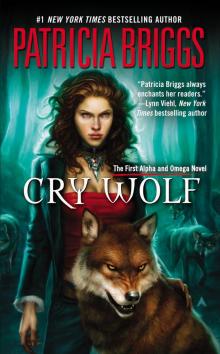 Cry Wolf
Cry Wolf On the Prowl
On the Prowl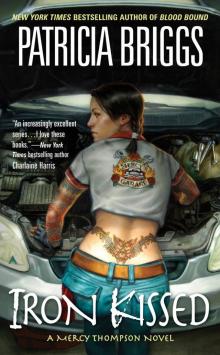 Iron Kissed
Iron Kissed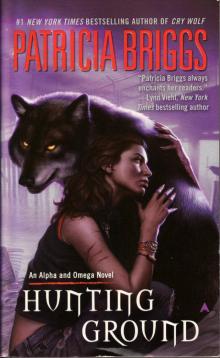 Hunting Ground
Hunting Ground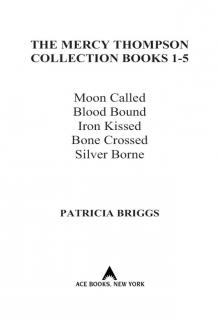 Patricia Briggs Mercy Thompson: Hopcross Jilly
Patricia Briggs Mercy Thompson: Hopcross Jilly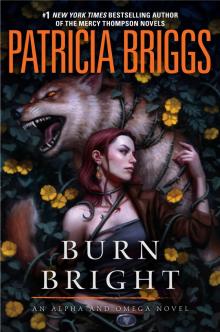 Burn Bright
Burn Bright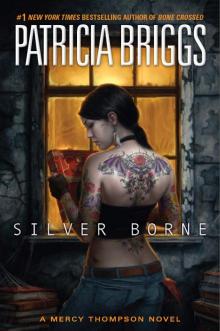 Silver Borne
Silver Borne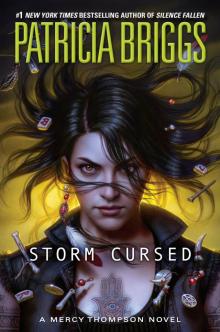 Storm Cursed
Storm Cursed Shifting Shadows
Shifting Shadows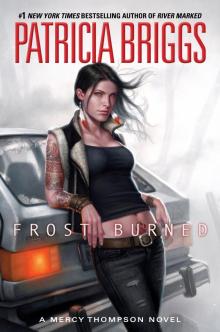 Frost Burned
Frost Burned River Marked
River Marked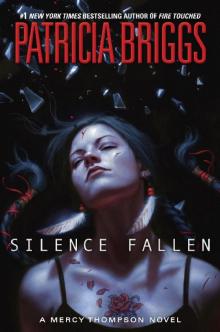 Silence Fallen
Silence Fallen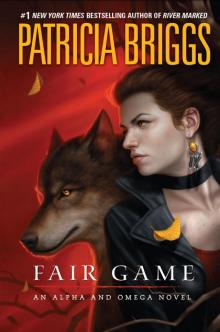 Fair Game
Fair Game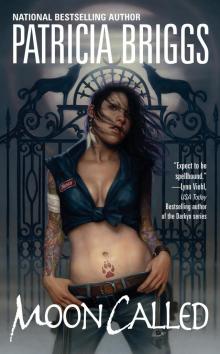 Moon Called
Moon Called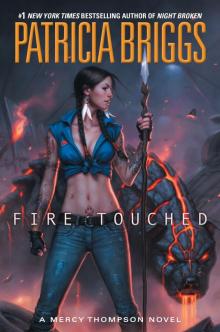 Fire Touched
Fire Touched Dead Heat
Dead Heat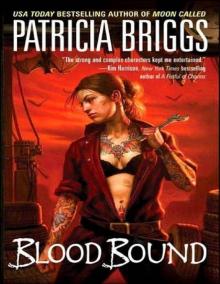 Blood Bound
Blood Bound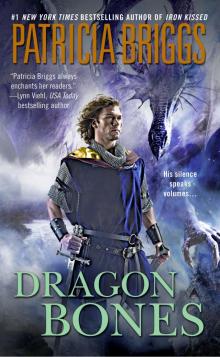 Dragon Bones
Dragon Bones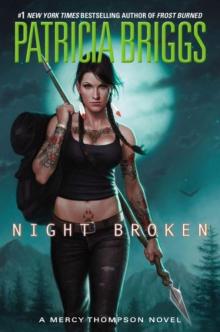 Night Broken
Night Broken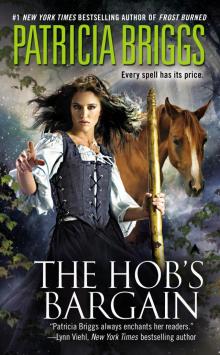 The Hobs Bargain
The Hobs Bargain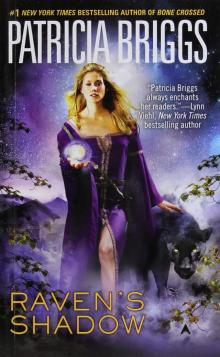 Ravens Shadow
Ravens Shadow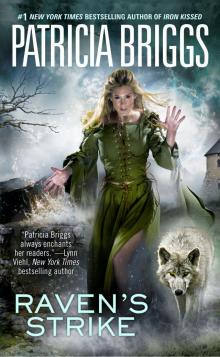 Ravens Strike
Ravens Strike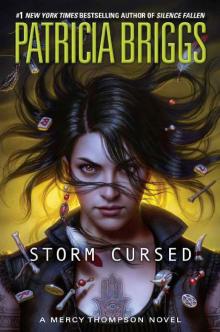 Storm Cursed (A Mercy Thompson Novel)
Storm Cursed (A Mercy Thompson Novel)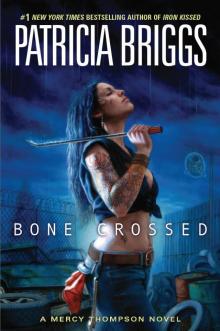 Bone Crossed
Bone Crossed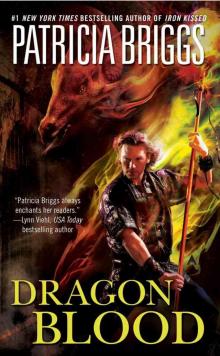 Dragon Blood
Dragon Blood Smoke Bitten: Mercy Thompson: Book 12
Smoke Bitten: Mercy Thompson: Book 12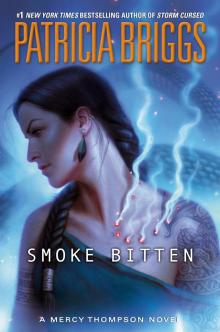 Smoke Bitten
Smoke Bitten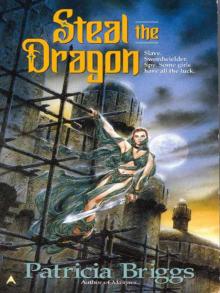 Steal the Dragon
Steal the Dragon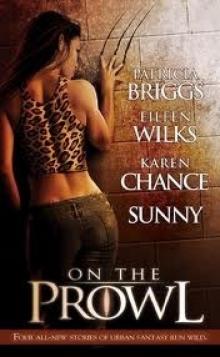 0.5 On The Prowl (alpha and omega)
0.5 On The Prowl (alpha and omega)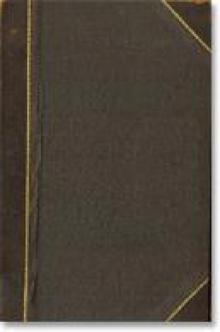 Alpha and Omega
Alpha and Omega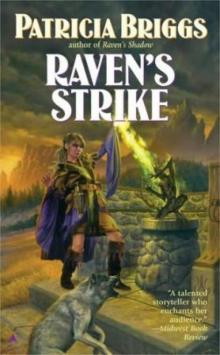 Raven's Strike rd-2
Raven's Strike rd-2![[Mercy 03] - Iron Kissed Read online](http://i1.bookreadfree.com/i/03/24/mercy_03_-_iron_kissed_preview.jpg) [Mercy 03] - Iron Kissed
[Mercy 03] - Iron Kissed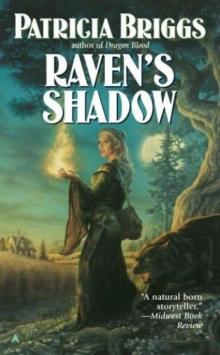 Raven's Shadow rd-1
Raven's Shadow rd-1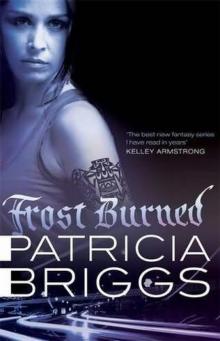 Frost Burned mt-7
Frost Burned mt-7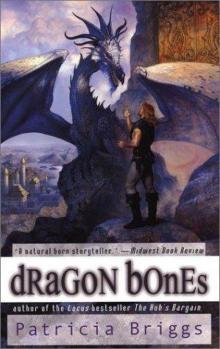 Dragon Bones h-1
Dragon Bones h-1 Shifting Shadows: Stories from the World of Mercy Thompson
Shifting Shadows: Stories from the World of Mercy Thompson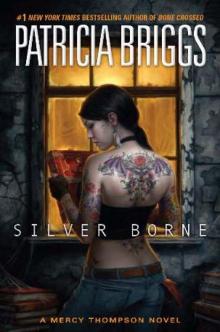 Silver Borne mt-5
Silver Borne mt-5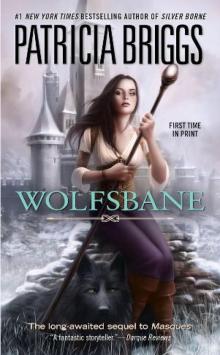 Wolfsbane s-2
Wolfsbane s-2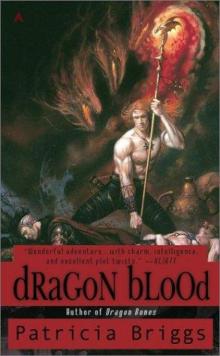 Dragon Blood h-2
Dragon Blood h-2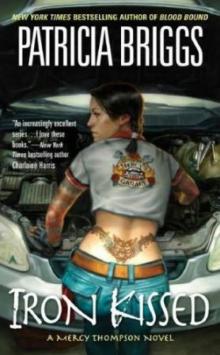 Iron Kissed mt-3
Iron Kissed mt-3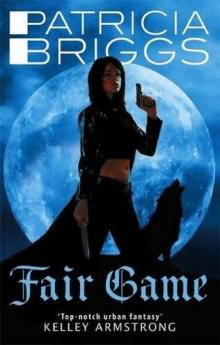 Fair Game aao-3
Fair Game aao-3 Masques s-1
Masques s-1![[Hurog 01] - Dragon Bones Read online](http://i1.bookreadfree.com/i1/04/03/hurog_01_-_dragon_bones_preview.jpg) [Hurog 01] - Dragon Bones
[Hurog 01] - Dragon Bones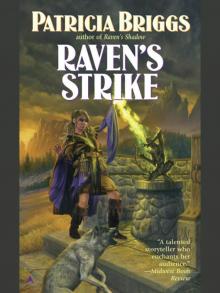 Raven s Strike
Raven s Strike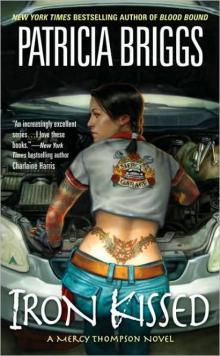 Mercedes Thompson 03: Iron Kissed
Mercedes Thompson 03: Iron Kissed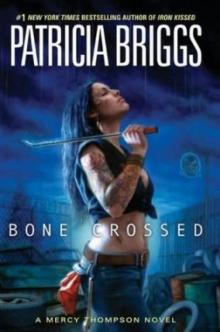 Bone Crossed mt-4
Bone Crossed mt-4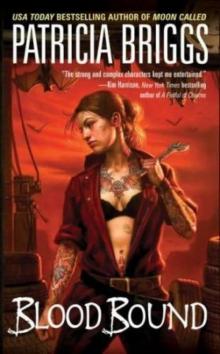 Blood Bound mt-2
Blood Bound mt-2![[Mercy 01] - Moon Called Read online](http://i1.bookreadfree.com/i2/04/09/mercy_01_-_moon_called_preview.jpg) [Mercy 01] - Moon Called
[Mercy 01] - Moon Called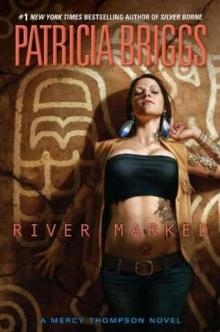 River Marked mt-6
River Marked mt-6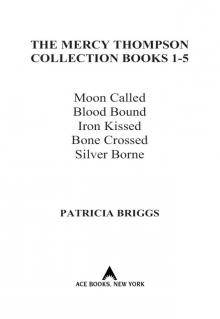 The Mercy Thompson Collection
The Mercy Thompson Collection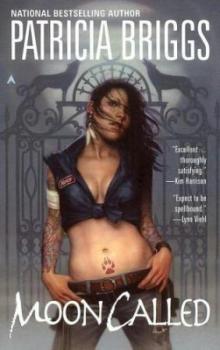 Moon Called mt-1
Moon Called mt-1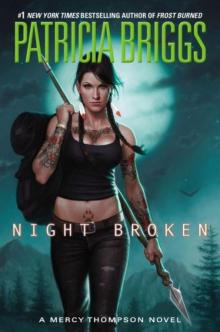 Mercy Thompson 8: Night Broken
Mercy Thompson 8: Night Broken